In the ever-evolving landscape of orthopedic treatments, one breakthrough that has garnered significant attention is regenerative orthopedics. This innovative approach encompasses a range of non-surgical procedures designed to harness the body’s natural healing mechanisms to repair and restore damaged bone, muscle, cartilage, and tendons. Dr Michael Poss Warrenton Virginia delves into the realm of regenerative orthopedics, shedding light on the health conditions that stand to benefit most from these cutting-edge therapies.
Exploring the Essence of Regenerative Orthopedics
Regenerative orthopedics draws upon three key therapeutic modalities to facilitate healing:
Prolotherapy: This technique involves the injection of an irritant solution into the injured area, provoking controlled inflammation. This inflammatory response triggers the body’s innate healing mechanisms, promoting tissue repair and regeneration.
Platelet-Rich Plasma (PRP) Therapy: PRP therapy utilizes the patient’s own platelets, rich in growth factors, to foster tissue repair and regeneration. By concentrating and delivering these growth factors to the site of injury, PRP therapy stimulates healing and enhances tissue regeneration.
Stem Cell Therapy: Stem cell therapy harnesses the potential of the patient’s own stem cells to repair and regenerate diseased or damaged tissues. These adaptable cells hold the promise of renewing injured areas, facilitating the body’s natural healing process.
Benefiting from Regenerative Orthopedics in Various Health Conditions
Regenerative orthopedics holds promise in addressing a variety of common health conditions, offering potential benefits that include:
• Osteoarthritis: Individuals grappling with osteoarthritis can find relief through regenerative therapies like PRP and stem cell treatments. These approaches stimulate the production of new cartilage, reduce inflammation, and mitigate pain associated with this degenerative joint condition.
• Tendinitis and Ligament Injuries: Conditions such as tennis elbow and Achilles tendinitis can be effectively treated with prolotherapy. By promoting tissue repair and reducing pain and disability, prolotherapy helps individuals regain function and alleviate discomfort.
• Musculoskeletal Pain: Chronic musculoskeletal pain, often a result of injury or wear and tear, can be managed using regenerative orthopedic treatments. These procedures offer the potential to regenerate damaged tissues, offering sustainable and long-term relief from pain.
• Degenerative Disc Disease: Disc degeneration can lead to debilitating back pain. PRP and stem cell therapies hold promise in not only alleviating pain but also stimulating the regeneration of degenerated discs, potentially restoring function and mobility.
• Rotator Cuff Tears: For individuals facing partial tears and injuries of the rotator cuff, regenerative orthopedics presents a non-surgical alternative. By stimulating tissue repair and reducing inflammation, these therapies contribute to healing and recovery.
Navigating Treatment Options with Professional Guidance
While the realm of regenerative orthopedics holds immense potential, it’s crucial to acknowledge that these treatments may not be universally applicable. Factors such as age, overall health, and the specific condition play a pivotal role in determining the most suitable treatment approach. Thus Dr. Michael Poss, seeking guidance from a specialist well-versed in regenerative orthopedic therapies is imperative. Consulting a professional ensures that individuals receive personalized recommendations tailored to their unique circumstances, fostering optimal outcomes and facilitating a path toward enhanced healing, function, and well-being.



